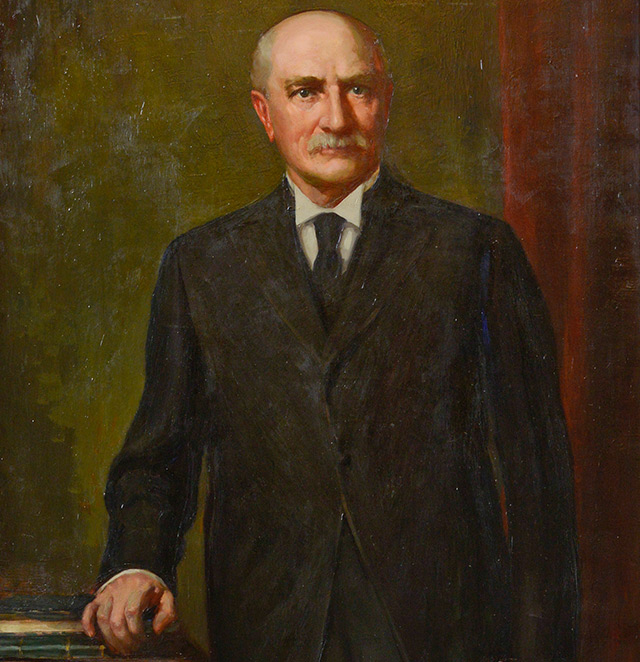Quotations from the Doctors Mayo
Memorable words from the Mayo brothers, Dr. Will and Dr. Charlie, and their father, Dr. William Worrall Mayo

The father of the Mayo brothers was a highly regarded doctor who inspired his sons with values that remain central to Mayo Clinic.
1866
"Left open for further thought and research." (Clapesattle H.C. The Doctors Mayo. 1st ed. Minneapolis, MN: The University of Minnesota Press; 1941:118)
1904
"My own religion has been to do all the good I could to my fellow men, and as little harm as possible." (Clapesattle HC. The Doctors Mayo. 1st ed. Minneapolis, MN: The University of Minnesota Press:1941:92)

Dr. Will, the elder Mayo brother, was an internationally acclaimed surgeon and ambassador of the medical profession.
1910
"The best interest of the patient is the only interest to be considered, and in order that the sick may have the benefit of advancing knowledge, union of forces is necessary." (Commencement Address, Rush Medical College, University of Chicago, June 15, 1910. Collected Papers of St. Mary's Hospital, Mayo Clinic. 1910; 2:557-566)
1910
"I would admonish you, above all other considerations, to be honest. I mean honesty in every conception of the word: Let it enter into all the details of your work." (Commencement Address, Rush Medical College, University of Chicago, June 15, 1910. Collected Papers of St. Mary's Hospital, Mayo Clinic. 1910; 2:557-566)
1914
"... science knows no country." (The Influence of European Surgery on American Practice. St. Paul M. J., 16:601-605, 1914)
1924
"Medical Science aims at the truth and nothing but the truth." (The Influence of Ignorance and Neglect on the Incidence and Mortality of Cancer. J. Indiana M. A., 17:331-334, 1924)
1926
"The ills of today must not cloud the horizon of tomorrow. (The Teaching Hospital of the University of Michigan. J. Michigan M. Soc., 25:9-12 (Jan.) 1926)
1931
"I look through a half-opened door into the future, full of interest, intriguing beyond my power to describe, but with a full understanding that it is for each generation to solve its own problems and that no man has the wisdom to guide or control the next generation." (Seventieth Birthday Anniversary. Ann. Surg., 94:799-800 (Oct.) 1931)
1934
"Our father recognized certain definite social obligations. He believed ... that the important thing in life is not to accomplish for one’s self alone, but for each to carry his share of collective responsibility." Gift from the Mayo Properties Association. Proc. Staff Meet., Mayo Clin., 9:116-119 (Feb. 21) 1934)
1935
"It is a great thing to make scientific discoveries of rare value, but it is even greater to be willing to share these discoveries and to encourage other workers in the same field of scientific research." Remarks on the Romance of Medicine. Proc. Staff Meet., Mayo Clin., 10:393-394 (June 19) 1935)
1935
"We have never been allowed to lose sight of the fact that the main purpose to be served by the Clinic is the care of the sick." (The Value of the Weekly General Staff Meeting. Proc. Staff Meet., Mayo Clin., 10:70-72 (Jan. 30) 1935)
1938
"It is for the younger people to meet the conditions of their generation in the way that appears to them to be wise and best." (The Establishment of "The Mayo Foundation House" and Its Purpose. Proc. Staff Meet., Mayo Clin., 13:533-554 (Aug. 31) 1938)

Dr. Charlie, the younger Mayo brother, was considered more informal and approachable than Dr. Will, but both brothers were equally esteemed by patients and colleagues.
1916
"The keynote of progress ... is system and organization — in other words, 'team work.'" (The Examination, Preparation and Care of Surgical Patients. Journal-Lancet, 36:1-4 (Jan. 1) 1916)
1919
"It is a poor government that does not realize that the prolonged life, health and happiness of its people are its greatest asset." (Educational Possibilities of the National Medical Museum; in the Standardization of Medical Training. J.A.M.A., 73:411-413 (Aug. 9) 1919)
1926
"There are two objects of medical education: To heal the sick, and to advance the science." (Problems in Medical Education. Collect. Papers Mayo Clin. & Mayo Found., 18:1093-1102, 1926)
1931
"Today the only thing that is permanent is change." (Tomorrow's Education Seen by Dr. Mayo. Northwestern University Alumni News, 10:17-19 (July) 1931)
1931
"The great contribution we can make is to prepare the oncoming generations to think that they can and will think for themselves." (Tomorrow's Education Seen by Dr. Mayo. Northwestern University Alumni News, 10:17-19 (July) 1931)
1931
"... if we excel in anything, it is in our capacity for translating idealism into action." (International Medical Progress. Collect. Papers Mayo Clin. & Mayo Found., 23:1020-1024, 1931)
1932
"The object of all health education is to change the conduct of individual men, women and children by teaching them to care for their bodies well ...." (When Does Disease Begin? Can This Be Determined by Health Examination? Minnesota Med., 15:40-42 (Jan.) 1932)
1936
"The problem before us is so to exchange information, and so to educate men through travel that there shall develop a final, cosmopolitan system of medicine which will combine the best elements to be found in all countries." (Preventive Medicine. Collect. Papers Mayo Clin. & Mayo Found., 28:1190-1192, 1936)
1937
"We must develop earlier in life an avocation, to maintain our interest in life. Such outside lines of thought and diversion are the more successful when they bring us in contact with nature, birds, gardens, geology, and the like." (Before and After Forty. The Rotarian, 50:24-27, (June) 1937)